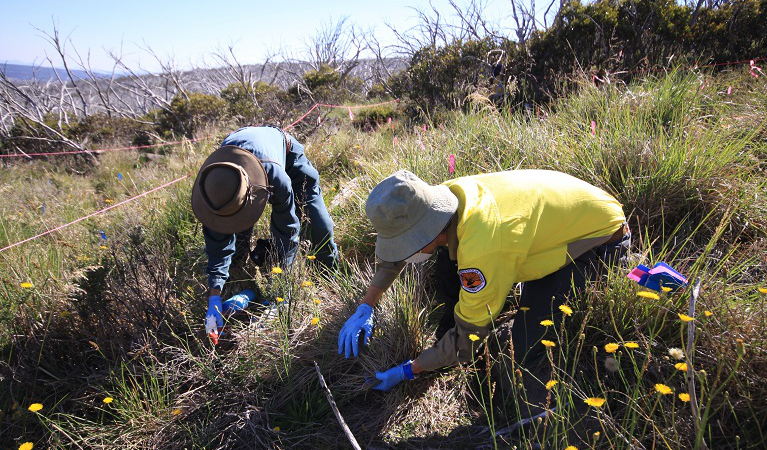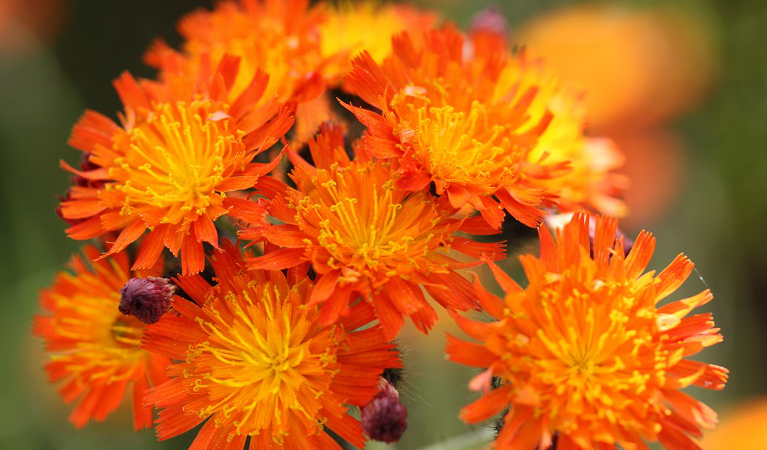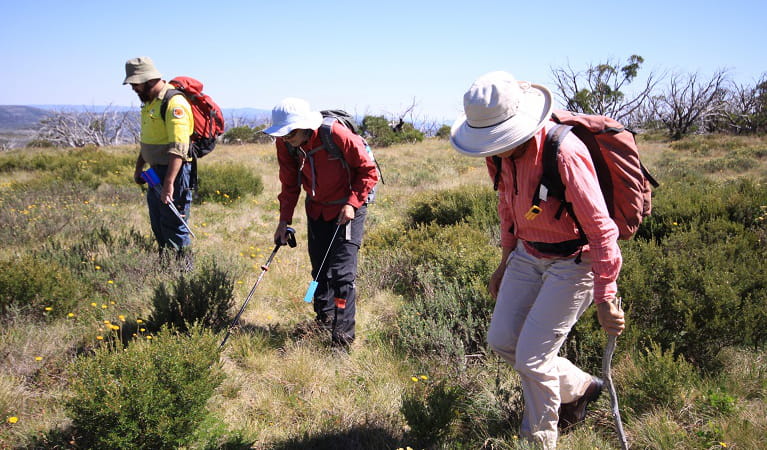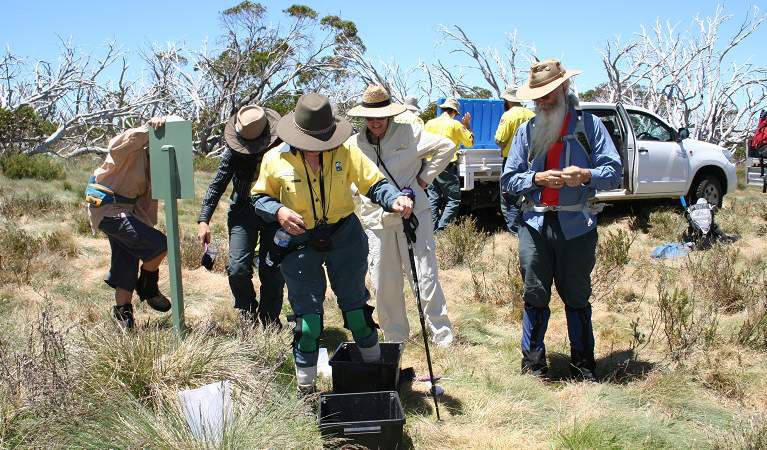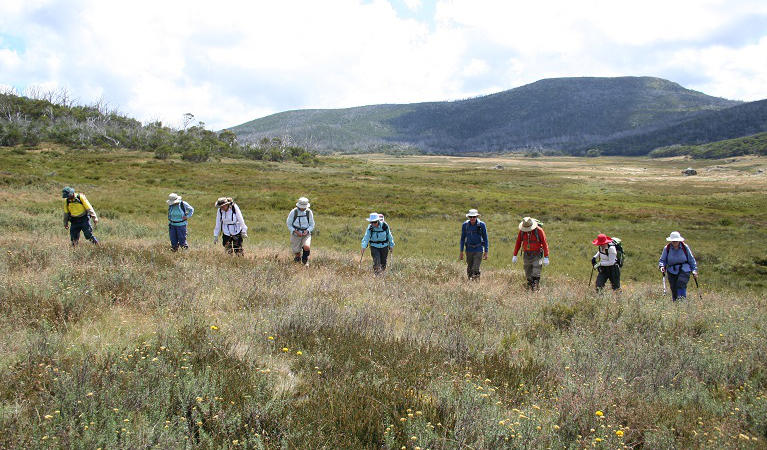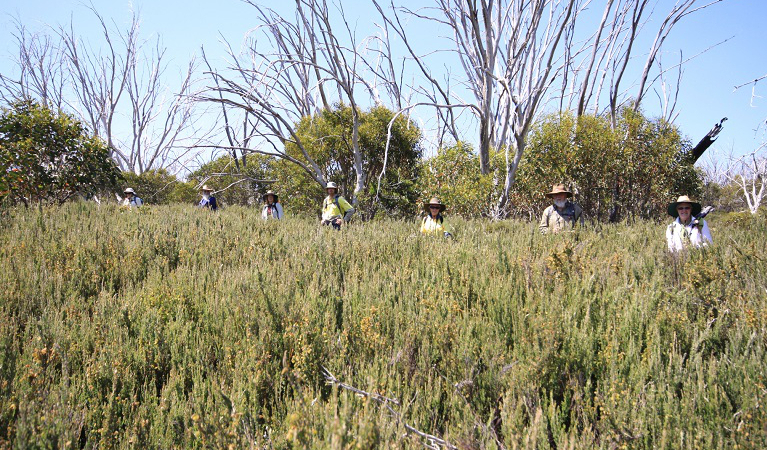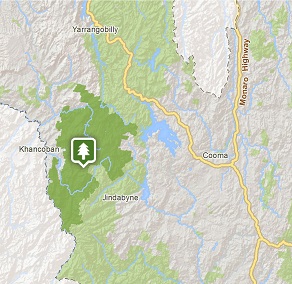Hunting hawkweed
Khancoban area in Kosciuszko National Park
Overview
Do you enjoy volunteering in the great outdoors? Join the hunt for orange hawkweed and help eradicate this invasive weed from the Jagungal Wilderness Area in Kosciuszko National Park.
- Work
- Bush regeneration, weed and pest management
- When
Currently not accepting applications.
- Where
- Khancoban area in Kosciuszko National Park in Snowy Mountains
- Grade
- Hard. Suitable for adults and teens 18 years and over. You'll need a good level of physical fitness (surveys require a lot of walking). You'll be walking approximately 4km a day, negotiating natural rough and uneven terrain (no paths) and moderate slopes on uneven surfaces.
- Please note
- You'll need to commit to volunteering for the entire week (Monday to Friday).
- Maximum of 5 volunteers per week.
- Free shared accommodation in Khancoban (Sunday evening through to Saturday morning).
- All bed linen and towels are supplied.
- NPWS will supply the basics for breakfast and lunch. Volunteers will need to bring food and prepare their own evening meals.
Orange hawkweed is a serious threat to the Australian Alps and surrounding environments, including productive farmland. It's known to out-compete native and pastoral plants, and is capable of creating a monoculture.
Since 2009, over 300 volunteers have helped us in the search for orange hawkweed across the Jagungal Wilderness Area. Volunteers are instrumental in protecting sensitive environments from hawkweed invasion, by finding and hand-treating plants. Week-long surveys coincide with the peak Hawkweed flowering period each year, when orange hawkweed is easier to detect.
Surveys are conducted in some of the most scenic areas of Kosciuszko National Park. Volunteers will stay in Khancoban. To ensure your stay is safe and comfortable, remember to bring:
- Personal medication (eg EPI pen, hay fever prevention)
- Good waterproof walking boots
- Thick socks
- Long pants and long-sleeved shirts
- Hat (broad rimmed, shades face and neck)
- Warm clothing and wet weather gear (weather changes rapidly, even in summer)
- Gaiters
- Drinking water (1 litre bottle)
- Day pack/backpack
- Sunscreen and insect repellent
- Lunchbox
- Camera
- Casual clothes and toiletries.
Find out more about volunteering with us
Saving Our Species program
Australia is home to more than 500,000 animal and plant species, many of which are found nowhere else in the world. Saving our Species is a statewide conservation program that addresses the growing number of Australian animals and Australian native plants facing extinction.
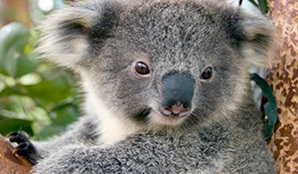
Park info
- in the Khancoban area of Kosciuszko National Park in the Snowy Mountains region
The Khancoban area is open all year, but access along the Khancoban to Cabramurra Road is closed in winter (June to October long weekends).
-
Park entry fees apply on Alpine Way
Winter (June to October long weekends): $29 per vehicle per day (24hrs from purchase); motorcycles $12; bus passengers $11.45 per adult, $3.60 per child per day. Find out more about the winter entry surcharge.
Rest of Year: $17 per vehicle per day (24hrs); motorcycles $7; bus passengers $6.60 per adult, $2.20 per child per day.
Passes: Single and Multi-Day passes available from Khancoban Visitor Centre's 24-hour vending machines, or via the Park'nPay app.
See vehicle entry fees for other areas in Kosciuszko National Park.
Buy annual pass
What's nearby:
Things to do (130)
- 4WD touring (4)
- Adventure sports (4)
- Birdwatching and wildlife encounters (7)
- Cafes and kiosks (2)
- Canoeing/paddling (3)
- Cycling (17)
- Educational activities (1)
- Fishing (14)
- Historic heritage (14)
- Horse riding (5)
- Other experiences (2)
- Photography (1)
- Picnics and barbecues (18)
- Road trips and car/bus tours (6)
- Show cave tours (6)
- Sightseeing (24)
- Snow sports (28)
- Swimming (6)
- Visitor centres (5)
- Walking (53)
- Waterfalls (6)
- Wildflowers (seasonal) (14)

